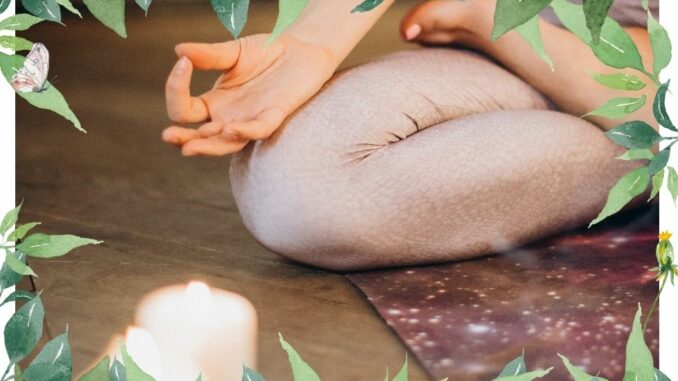
In a fast-moving time, man is immense high levels of stress exposed. It is not uncommon for the many different demands of everyday life to push both men and women to their mental and physical limits. Various mindfulness exercises offer very good help to strengthen your own resilience and resistance to stress reactions.
Mindfulness means more than just taking good care of yourself
Many people think despite that everyday stress "It's pretty good to take care of yourself." You might try with healthy diet, sporting activities, various leisure activities and other coping strategies of self-care to counter the stress. However, they often put themselves under even more pressure as a result. They also think they have to do something special in these activities. Instead of pausing, reigns supreme in all walks of life only pressure to perform. More and more goals for a supposedly good life have to be achieved. The focus is almost exclusively on these goals and the future life.
Not only the stressful everyday work, but also the entire free time is dominated by the achievement of the ambitious goals. The entire day is clocked down to the minute. Without perhaps noticing it themselves, people live in their thoughts only in their expectations of a better future when they have achieved all their important goals. Life in the here and now is almost completely lost for one or the other. Mindfulness means sharpening your own perception and awareness of the essential moment: the "now", this one moment in the "here" in which life really happens.
Being able to consciously enjoy life between past and future with mindfulness

But not only the longed-for future brings people to the Losing awareness of the present moment. The past also keeps people from shaping and enjoying their lives in the present. Perhaps the thoughts are still dominated by unresolved problems from the past or life was somehow better, perhaps in childhood or adolescence.
Not infrequently, thoughts then only move back and forth between these past and future times. Life in the present just happens like that. Attention to the moment is completely lost. Man loses himself in his daydreams of a more beautiful past or a better future. the different concepts and exercises of mindful living get people out of these thoughts and enable them to consciously enjoy their life in the present.
Mindfulness - a Far Eastern concept for more health and joie de vivre
The basic ideas of mindful living come from Far Eastern philosophies such as Buddhism. Various mindfulness practices, such as the Meditation, Yoga, Conscious Breathing, and others, teach man to still his restless and ever-working mind. Attention is immediately drawn to life in the present moment. This changes the perception of the processes in one's own body, mind and feelings. With the conscious perception of one's own life in the here and now, the connection to the self is reestablished. Thoughts become clearer. The joy of life returns.
People become mentally stronger and thus healthier overall. He is less subject to his emotional fluctuations in the recurring ups and downs of a turbulent and fast-paced living environment. Stress reactions are lowered. His resilience, the power to resist stress factors, is increased through mindful living. The resilience is increased. The stress is less perceived, constant brooding or mental loops disappear. Acute overloading can be alleviated at first with the help of mindfulness exercises and then completely mastered as the exercise progresses. This increase in resilience has a positive impact on overall human health.
Improving and strengthening physical health through mindfulness practices
Mindfulness has one positive effect confirmed by science. The various mindfulness exercises not only contribute to an improvement in the psychological defenses against constant stress. The entire human organism is also positively influenced by mindful living. The mindful breathing exercises ensure improved blood circulation throughout the body and its organs. The mental reduction of stress factors has a positive effect on the body's cardiovascular system. Vascular diseases such as high blood pressure and others can be avoided or improved with the help of mindfulness exercises. The increased joie de vivre helps to enjoy movement more. Many illnesses, such as back problems, obesity, diabetes, a reduced immune system and many others can also be avoided or improved through the increased joy of movement.
Effective mindfulness exercises that can be easily integrated into everyday life
The meditation exercises of Zen Buddhism, yoga and other Far Eastern practices form the basis for mindfulness exercises. However, very simple exercises can be integrated into everyday life, which, if practiced repeatedly and regularly, can bring about very good improvements in general well-being and stress reduction.
Mindful Breathing
Mindful breathing is one of the most important meditation practices in Buddhism. The conscious perception and observation of one's own breathing. Mindful breathing means: again feeling the air being drawn into the lungs, filling the chest and being exhaled again. When consciously observing breathing, the breath becomes deeper, more even and calmer. Relaxation, rest and relaxation return. The better supply of oxygen to the body leads to an improvement in general health. Mindful breathing can be practiced multiple times a day, during short breaks, or at set times in a quiet environment.
Mindful Eating
When stressed, people tend to gorge on food quickly. Often they don't even register exactly what they're eating. The practice of mindful eating can and should be done at every meal. Chewing slowly and consciously tasting the different foods activate the taste buds and have a positive effect on the sense of taste. Your own perception of the really beneficial foods is strengthened.
mindful walking
In mindful walking, the feet are placed slowly, step by step, on the ground. The calm, consciously perceived walking ensures an overall improvement in posture. With "mindful walking" the senses are sharpened through the perception of the different soil conditions and the processes in the body when walking. Mindful walking can be easily integrated into everyday life at any opportunity.
Changing routines and not doing things at the same time
They are always the same repetitive routines of everyday life make the attention dwindle. During practice, the mind is occupied with other things and subject to constant distractions. For a mindful life, the routines that always remain the same should be consciously changed. This also creates a concentration on the essentials in the daily routines. “Bad” habits or routines can be consciously sorted out. Doing things in a row creates order in your thoughts. The "multi-tasking", the talking to each other of your own thoughts can be stopped with this mindfulness. People put their head and heart into whatever they are doing.
Sharpening of the senses and conscious perception
All of these mindfulness exercises are aimed at sharpening the sensory perceptions and conscious being in the here and now. In this way, the senses of smell, sight and touch can also be promoted with conscious awareness. Expanded sensory perception is increasingly empowering people to make healthy choices and turn to things that are good for them, their minds and bodies.
Keep order
Few things distract the mind more than clutter in the environment. Whether at home or at work, clutter has a detrimental effect on people's mental health. In the unconscious perception, the mind is constantly occupied with the things in its environment. Clutter can cause a certain level of stress without even being aware of it. Further stress is added when the clutter creates further pressure as a constant need to clean up. A careful order and careful handling of things leads to stress reduction and relief. A careful attitude towards order supports the sense of well-being and increases the joy of perceiving the surroundings, right down to the deliberately chosen minimalism.
Audio books as support
A great help and support in the integration of mindfulness exercises into everyday life is offered by the Audible audiobooks on mindfulness. Mental mindfulness training is trained in these audio books. Mental distractions are all but eliminated when listening to the audiobooks. The spirit is led into the conscious perception of its being in the here and now.
Turn to positive thoughts and do yourself good
Mindfulness in everyday life means becoming aware of the flood of thoughts and feelings. Many small and large annoyances, problems and worries cause an unconscious accumulation of negative thoughts. These in turn cause considerable unconscious stress. The conscious mindful sorting of one's own thoughts on the occurrences of everyday life makes it possible to turn to positive thoughts. Quite a few problems only arise as a result of negative thinking and, on closer and careful inspection, are less serious or even non-existent. Practicing mindfulness about your own thinking helps you to have a positive attitude towards life and thus ensures a higher quality of life and joie de vivre. Focusing on positive thoughts also brings awareness of things that are really good for the mind and body. The attention and the love for one's own being is strengthened.
Continuous practice of mindfulness
Humans are creatures of habit and negative routines quickly creep back into everyday life. Only continuous practice of mindfulness can protect against this. To do this, it is important to incorporate certain mindfulness routines into everyday life that counter negative patterns or effectively switch them off. These routines in the mindfulness exercises can be practiced in the morning when you get up, such as breathing mindfully for a few minutes, but they can also be spread throughout the day. Small and large distances can be covered with mindful walking. Meals are taken with mindful eating. Several short breaks can be inserted for mindful breathing and conscious mindful positive thinking. With regular practice, mindfulness exercises become a conscious daily routine.
Table of Contents



Leave a comment now